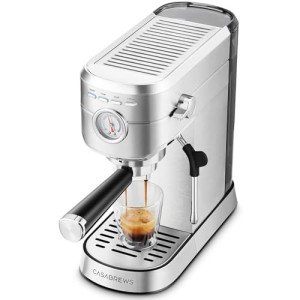The World of High-Quality Espresso Machines: A Comprehensive Guide
Espresso has actually ended up being a cherished drink among coffee lovers worldwide, known for its abundant flavor, intense fragrance, and versatility. The heart of a great espresso lies in the machine used to brew it. High-quality espresso machines are designed to provide the ideal shot, making them a necessary financial investment for coffee lovers. coffeee.uk explores numerous kinds of high-quality espresso machines, their functions, upkeep suggestions, and answers to often asked questions.
Kinds Of High-Quality Espresso Machines
High-quality espresso machines fall into several classifications, catering to different preferences, ability levels, and spending plans. The main types consist of:
| Type of Machine | Description | Suitable User |
|---|---|---|
| Manual Espresso Machines | Needs user skill to control extraction and pressure. Provides the most control over the brewing procedure. | Experienced baristas and lovers |
| Semi-Automatic Machines | Combines manual operation with automation. Users manage the grind and tamping, while the machine deals with water dispersion. | Intermediate users |
| Automatic Espresso Machines | Automate the developing procedure, permitting for programmable brewing times and temperatures. | Casual coffee drinkers |
| Super-Automatic Machines | Have integrated grinders and are fully automated, dealing with everything from grinding to developing and steaming. | Users looking for convenience |
| Commercial Espresso Machines | Created for high volume use in coffee shops and restaurants, providing resilience and speed. | Entrepreneur |
In-depth Overview of Each Type
Manual Espresso Machines
- Pros: Complete control over the brewing process; can produce extraordinary quality espresso.
- Cons: Requires substantial ability; time-consuming.
Semi-Automatic Machines
- Pros: Balanced control, mixing manual and automatic procedures; exceptional quality espresso is still attainable.
- Cons: Requires some understanding and experience to master.
Automatic Espresso Machines
- Pros: User-friendly; reduces the discovering curve while still producing high-quality espresso.
- Cons: Still needs some understanding of coffee-making basics.
Super-Automatic Machines
- Pros: Maximal convenience; little ability required; perfect for individuals or households who desire coffee without fuss.
- Cons: Higher rate point; might lack the fine-tuning capabilities of manual machines.
Commercial Espresso Machines
- Pros: Built for longevity and efficiency; often includes functions for high-volume turns.
- Cons: Expensive; might be overkill for home use.
Key Features to Consider
When looking for a high-quality espresso machine, several crucial features need to be taken into consideration:
- Pressure and Pump Type: Look for machines with at least 9 bars of pressure, which is vital for drawing out the very best taste from coffee beans.
- Boiler Type: Single, double, and heat exchanger boilers each affect how the machine carries out and the speed of developing.
- Develop Quality: High-quality products such as stainless steel are preferable for durability and aesthetic appeals.
- Alleviate of Use and Cleaning: Some machines need extensive cleansing, while others are created for simple upkeep.
- Temperature Control: Consistent temperature is critical; think about machines with PID controllers for accurate control.
Advantages of High-Quality Espresso Machines
Investing in a high-quality espresso machine offers a wide range of advantages:
- Superior Quality: High-end machines enable greater control, causing more delicious espresso.
- Sturdiness: Built to last, quality machines require less repairs and replacements.
- Customization: Users can delight in a customized experience by changing grind size, shot timing, and other settings.
- Increased Convenience: Automatic and super-automatic alternatives enable enthusiasts to enjoy espresso with very little effort.
Upkeep and Care for High-Quality Espresso Machines
To keep an espresso machine functioning efficiently, regular maintenance is crucial. Here are suggestions for keeping a high-quality espresso machine:
Descale Regularly:
- Use a descaling option every few months to prevent accumulation of minerals from water, which can impact taste and performance.
Tidy the Brew Group:
- For machines with a removable brew group, tidy it frequently to guarantee a clean extraction.
Change Water Filters:
- Use a water filter and alter it as required to lessen impurities in your brewing water.
Daily Cleanings:
- Rinse the portafilter and group head after each use to avoid oil accumulation.
Watch on the Parts:
- Monitor seals, gaskets, and other parts for wear and tear and replace them as necessary.
Frequently Asked Questions (FAQs)
1. What is the best espresso machine for beginners?
For beginners, a semi-automatic machine frequently offers a good balance of use and control, permitting users to discover the abilities essential for making excellent espresso.
2. Are super-automatic machines worth the financial investment?
Yes, for those who prioritize convenience and ease over control, super-automatic machines can be a deserving financial investment, particularly for households or hectic specialists.
3. How much should I anticipate to invest on a high-quality espresso machine?
High-quality espresso machines vary significantly in rate, with manual machines beginning at a couple of hundred dollars, while super-automatic or commercial machines can surpass a number of thousand.
4. Can I make other coffee drinks with an espresso machine?
Yes, lots of espresso machines have steam wands or accessories that enable users to produce lattes, coffees, and more.
5. How long do espresso machines generally last?
With correct upkeep, high-quality espresso machines can last over a years, making them a long-term investment in your coffee pleasure.
High-quality espresso machines yield a transformative coffee experience, whether taken pleasure in at home or in a commercial setting. By comprehending the types available, their features, and the maintenance required to keep them running efficiently, consumers can make informed choices that raise their coffee-drinking experience.

